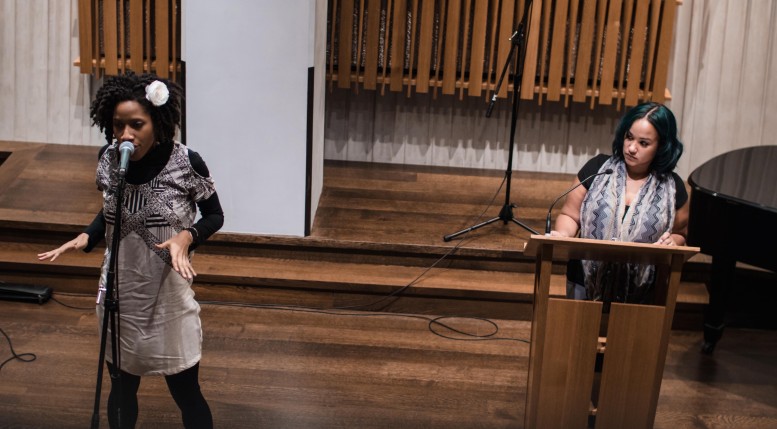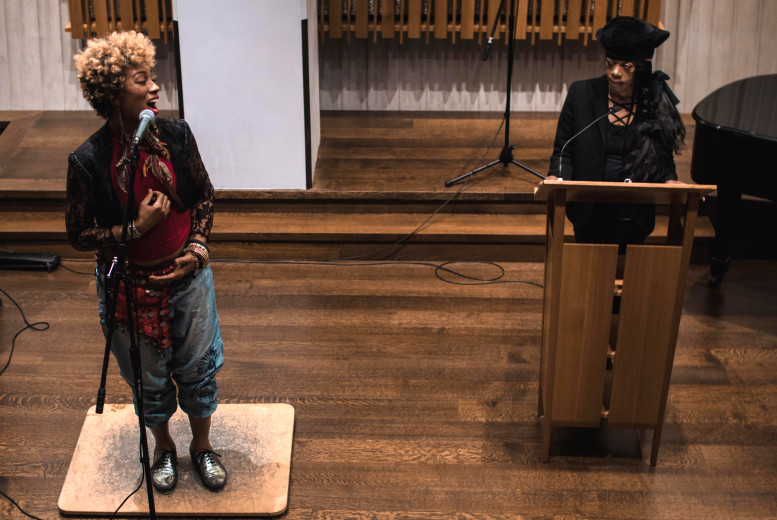This winter, I directed and co-conceived Chains Don’t Rattle Themselves, an event featuring autobiographical stories by formerly incarcerated writers and affected family members, as well as original songs by singer/songwriters adapted from those stories. A collaboration between The Songwriter’s Orchestra and Herstory Writers Workshop, the show derived its title from a forthcoming memoir by one of the featured writers, Dathonie Pinto. To me, the title suggests two ideas: it takes more than one person to escalate a potentially dangerous situation, but it also takes more than one person to make some real noise.
The project was performed in Manhattan and Long Island to marshal support for the Raise the Age NY campaign, which sought, over the last five years, to stop NY State from prosecuting 16-year-olds and 17-year-olds as adults. Legislation to raise the age was finally passed (with some compromises) this April, an important step on the path toward a more just NY.
In pairing up these artists and memoirists, I was hoping to make space for people from different walks of life to find surprising connections between them. The songs that followed were emotional beyond what I had imagined, demonstrating the power that can come from synthesizing unlikely elements: a classical orchestra and contemporary music genres, professional performers and people with no connection to the theater, and musicals and urgent activism.
These interviews have been edited for clarity.
Dathonie Pinto
Dathonie’s story describes a moment of domestic violence that led to her 16-year old son Prince’s arrest, a moment in which he attempted to defend the family against his father. She goes on to relate the experience of Prince’s birth.
Can I be honest? Initially, when you said it was going to involve an orchestra and singer/songwriters, and then Brinae told me she was going to tap dance, I was thinking to myself, that’s a lot! How are us writers going to fit into that? People would say, ‘oh that’s not gonna work, it’s gonna cheapen your writing,’ but it really highlighted the writing, and I thought our stories were done total justice. So it was nothing I expected, but it ended up very beautiful.
When I started writing, I was reluctant to tell the story actually, because I’m a very private person. But it was really important for me to share that you can come from a dark place into the light. When my son was incarcerated at 16, I felt totally responsible, as I’m sure most any mom would, especially if he’s never had any problems with the law. To get in trouble in the comfort, supposedly, of your own home is just not right.
Hearing the song for the first time was really strange, it definitely was, but it was actually touching. She definitely captured the story, and she incorporated my son’s name into the song, which was really nice. She managed somehow to take those words and give it meaning through music.
I think music is life. Music is everything. I’m really a character: I ran the NYC half marathon, and I also do yoga, and I always say yoga and running are the same thing. Because yoga is meditation, and running is moving meditation. Now I liken the concert to that—the composing and the story writing, it’s all one thing, it’s all about trying to get your creative minds together to make some kind of harmony, to reflect the symphony of life.
Brinae Ali
Brinae, a singer/songwriter and tap dancer last seen on Broadway in Shuffle Along, turned Dathonie’s story into the song “Ever So Fluid.”
The story really allowed me to empathize and imagine if that was me and if I had a son. Because I am a mother—I don’t have a son yet, but he will be an African-American boy and be labeled that way whether his father is a black man or not, and that’s her situation. The type of men that you bring into your life, the danger of domestic abuse, all of that…I was pulled in because I identify with her concerns. These are things you have to look out for.
When we spoke before I wrote the song, I asked her a lot about forgiveness, how she was able to heal and forgive and find the courage to move on, because I know how heavy that can be to constantly blame yourself, especially if your son is still scarred years later.
I was sitting in the bathtub—it’s like my sanctuary space—listening to the water and thinking about when I was pregnant, the fluidity of life. That’s when I heard the melody in that phrase [“ever so fluid”]. I wanted to find a way to speak about a painful transition into a victorious moment in life. And that was the beauty of the whole program to me—here are these stories, but see how they overcame. I think a lot of times we don’t get a chance to celebrate the victories. That was where my head was: I want to be able to groove to it, to rejoice, to invoke that spirit of God, of triumph. Then you work with Solomon [Hoffman, arranger and Artistic Director of The Songwriter’s Orchestra], who takes it to the next level. That’s when you know creativity is so much more than our human experiences. It’s really a spiritual journey.

Anjelique Wadlington
Anjie’s story recounts a promising job interview complicated by her criminal record.
I just wanted Olivia to be original and authentic to her when writing the song. I wanted to know who she was. And she’s very upbeat, so hearing her song with my story in it…I felt like it wasn’t sad, and it wasn’t over. I’m in the middle of everything, I just went through a breakup after 10 years, and the song helped me, because I have a lot more to go. I loved it.
I was honored to stand next to her, because she’s very inspirational. I was just like, wow! Her voice, her spirit, everything. And because I never did anything like this, she helped me with eye contact and hand movements, saying “we’re going to do this together.”
In the beginning of one of my stories, I describe what I used to think about women in prison (“Low lives, dirty, worthless females…selfish cowards…caged dogs, sloppy pigs…”). That was my true opinion about them. And then I was them. So I want people to be able to see that it could be them, or it could be a family member. People are so quick to judge and point fingers, and I did for a while, and now that I’m able to tell my story, they’re surprised, they didn’t see it that way.
Right now, I’m vice president of Hall Leadership Academy, which trains people in youth trauma services, and I work with the Raise the Age campaign. When I was a kid, I always told my mom I wanted to save the world. And then I kept getting defeated. So my mentor told me, “you’re not going to save everybody, but at least you can save one person at a time.”
Olivia Harris
Olivia performed with Anjie in “Same Old Conclusion,” a musical sequence adapted from the story.
I had a very visceral reaction to Anjie’s story, and I didn’t expect to. When I finished reading, I was angry, and I was crying. I knew these stories were going to be difficult, in that the subject matter would involve extreme moments of stress that I wouldn’t be accustomed to in my own daily life. But I was completely floored that it was about leaving jail and trying to re-enter the real world. The fact that it’s about a job interview, I very much identified with that, especially when she says they were surprised that she was black because her voice didn’t match her skin. I felt that so deeply as someone who went to majority-white schools. That’s something I had to work really hard on to survive, knowing what words and what tone to use. She was doing that too, editing herself, all to get a job, which her parole mandated.
When we were performing, I was kind of in the position of Obama’s anger translator from Key & Peele. She’s reading something she wrote a long time ago about something that happened even earlier, so she’s removed from it. But for me, I’m translating the text into a moment when I’m present and everyone’s present with me.
It was such an honor, especially because the story’s called “How Do You See Me?” and it’s about being seen. The fact that she was there and she could be seen was really powerful. And her standing there beside me as we told the story was the craziest moment! When you perform with anyone, you do something together emotionally even when there’s no words shared. There’s nothing we said about it, but being in that moment with Anjie is something I will never be able to really explain to anybody else. It’s a moment of, for me, solidarity.
Author
-

Alex Hare is a director pursuing a path as a citizen-artist -- in one sense, creating work that's informed by movements for justice and visibility, and in another, bringing an artistic sensibility to participation in civic life. Co-artistic director of the theater collective The Brewing Department, Alex has developed and premiered work at HERE Arts Center, Cherry Lane Theatre, Dramatists Guild, NYCFringe, Dixon Place, Irondale Center, and Feinstein's/54 Below. He is a frequent assistant for film/theater director Bill Condon, including on "Side Show" (Broadway, Kennedy Center) and the 2017 live-action remake of "Beauty and the Beast." Other assistant directing credits include "School of Rock" (Winter Garden Theatre) and "Straight" (Acorn Theater). Alex studied English Literature and American Studies at Columbia University.
View all posts









